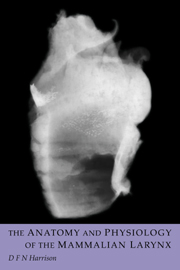Preface
Published online by Cambridge University Press: 05 October 2010
Summary
In 1929 Victor Negus, a Junior Surgeon for Diseases of the Throat and Nose, Kings College Hospital, London, published a book entitled The Mechanism of the Larynx. Part of this was based on his research for a Degree of Master of Surgery in the University of London. However, this 528 page volume contained unique observations on the comparative morphology of a wide range of animal larynges, cumulating in a fundamental account of the origin, development and mechanism of this unique organ.
Early in my own laryngological career, I had read and marvelled at the erudition of this ‘amateur comparative anatomist’, ultimately hoping to extend his research by utilizing modern techniques and a wider range of animals. As Professor of Laryngology and Otology at the Institute of Laryngology and Otology in London, I had developed a laboratory for sectioning human larynges removed for cancer. This was for an investigation into the manner by which neoplasia spreads through this organ. On completion of this research in 1976, these facilities became available for detailed examination of other mammalian larynges. Specimens were collected over the following 17 years from zoological institutions, game parks and helpful friends throughout the world. Most, however, came from post-mortems carried out in the Pathology Department of the Zoological Society of London. Without the enormous support and good will of this institution and many other helpful people, this unique collection of mammalian larynges would have been impossible; my gratitude is infinite.
- Type
- Chapter
- Information
- The Anatomy and Physiology of the Mammalian Larynx , pp. xi - xiiPublisher: Cambridge University PressPrint publication year: 1995

